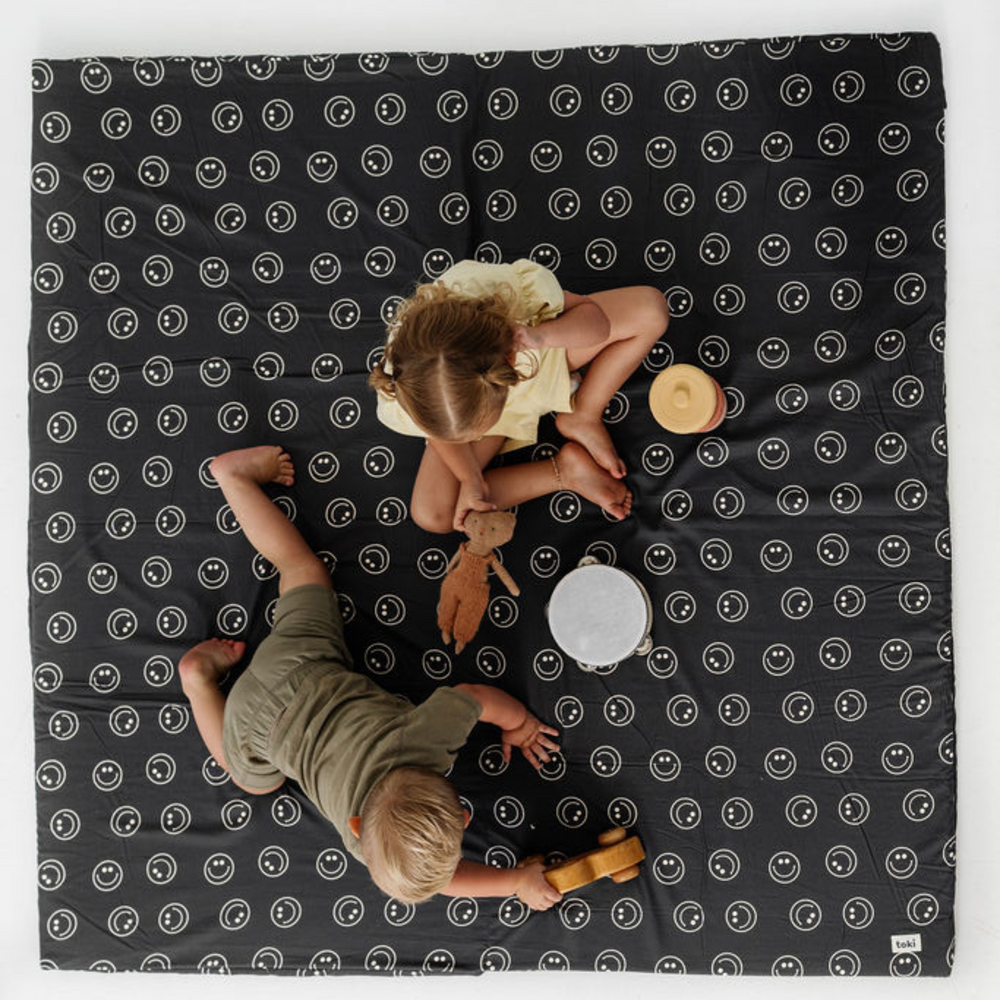Ask an Expert: Tummy Time and Starting Solids with Brooke Boruff, OTR/L
August 4, 2025
Brooke Boruff, founder of Infant Insights, lends us her expertise as a pediatric occupational therapist and mom who specializes in baby development.

Every parent looks forward to the day their baby takes their first bite of real food. After all, starting solids is a big milestone—one that signifies a new stage of development and brings them closer to independence. When we eat, we don’t think about all the muscles and neural connections it takes to sit up straight, scoop the food with a spoon, bring the spoon to our mouth, chew, and swallow. But, for a little baby, these things don’t come naturally. Setting the foundation for these skills starts early, with plenty of tummy time on a soft surface.
How Tummy Time Affects Readiness to Start Solids
Babies are born with very little muscle tone, which can give them the appearance of being “floppy.” They have to work hard to build the strength needed to move, eat, and engage with their environment. One of the best ways to support that development? Tummy time.
Tummy time, even from day one, encourages muscle development in the neck, upper body, and back. This proximal strength (strength through the midline of the body) leads to better stability in other areas, like the arms, hands, and mouth. This means that tummy time plays a direct role in helping your baby get ready to start solids!
How Tummy Time Supports Arm Development
When babies bear weight through their upper body during tummy time, they activate and strengthen their muscles. It’s hard work for newborns, but as they grow older and stronger, tummy time really sets the stage for other fine motor and gross motor skills.
-
In the newborn stage, placing your baby’s arms under their chest gives them leverage to start lifting their head, building neck and upper body strength.
-
As they grow, they begin pressing through their arms, building more control and coordination.
-
Eventually, they start to rotate and pivot on their belly, using their upper body to move and explore.
All of these movements help your baby develop the strength they need to bring a spoon to their mouth during mealtime.

How Tummy Time Supports Hand Development
As your baby gets stronger, they begin to pivot and root around in circles on their tummy. During this movement, they use their palms and fingers to push themselves, which encourages muscle development in the hands and fingers. This strength is essential for:
-
Picking up finger foods
-
Grasping utensils
-
Coordinating hand-to-mouth movement
When your baby plays with toys during tummy time, they’re building the coordination needed to manipulate food and utensils during feeding.
How Tummy Time Supports Oral Motor Development
All the muscles in the body are connected, so it makes sense that the oral muscles rely on head and neck strength.
-
When your baby lifts their head in tummy time, they’re building the foundation needed for safe chewing and swallowing.
-
Strong neck and jaw muscles lead to better oral motor coordination.
-
As your baby mouths toys during tummy time, they’re developing important feeding skills, like chewing, tongue movement, and oral exploration.
In short, head and neck strength are essential for developing strong oral muscles. And, mouth play, whether in tummy time or not, supports your baby’s readiness for solids.
Tummy Time Doesn’t Have to Be Complicated
The good news? You don’t have to overthink it. Simple, consistent tummy time is enough to help your baby build the strength they need.
Here are a few easy ways to incorporate it:
-
For newborns, try tummy time on your chest, over your shoulder, or with a support pillow.
-
As your baby grows, use a soft surface, like a play mat, and offer exciting toys to keep them engaged.
By consistently offering tummy time, you’re helping your baby develop the strength and coordination needed to start solids around 6 months of age.
Offer tummy time early and often to set your baby up for success. And if you need help getting started, download the Infant Insights free tummy time guide! You can also use this link to receive 15% off your play mat or support pillow.

How Tummy Time Affects Feeding Success
Tummy time can set the stage for a successful journey in starting solids because so many of the same skills are required for both.
If a baby is uncomfortable in tummy time, they may not have developed the head and neck control needed for safe, confident eating. This can lead to:
-
A delayed start with solids
-
Missed windows for exposure to new tastes and textures
-
Challenges accepting a variety of foods
Additionally, babies who are unstable in tummy time often struggle with stability in the feeding seat, which can make meals feel uncomfortable or even unsafe. And when a baby doesn’t feel stable, this may lead to negative associations with the high chair.
Positioning Is Key in Feeding
Tummy time supports strength and stability in the:
-
Neck and head
-
Upper body and trunk
-
Arms and hands
All of those are crucial for safe, enjoyable mealtimes. Offering tummy time early and often helps kick-start feeding success, long before their first bite of solids!

Shop the blog
Blooms Vegan Leather Mat
$225 - $545
An ultra comfy, mess-proof play mat for tummy time and soft seating inside, outside, or wherever you go.
Shop Now
About the Author: Alice
Alice Mendoza is a copywriter and blog writer based in Los Angeles. She began writing for a baby brand while on maternity leave, and realized she had found her niche. Today, she writes exclusively within the baby space, using her BFA in Creative Writing and her own experience as a mother to guide her. When she’s not working, you can find her chasing down her toddler, going on walks around the neighborhood, or watching reality TV.





































